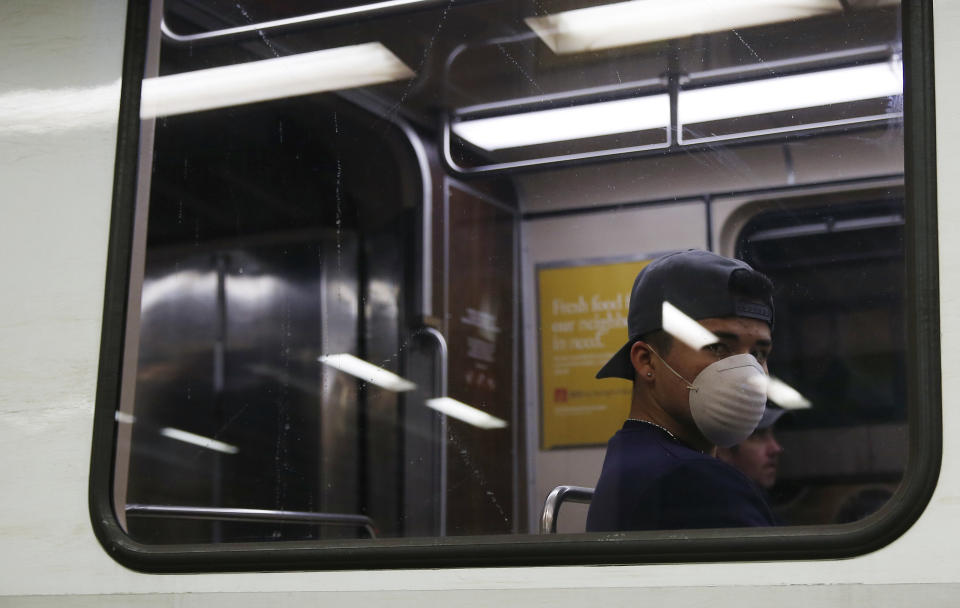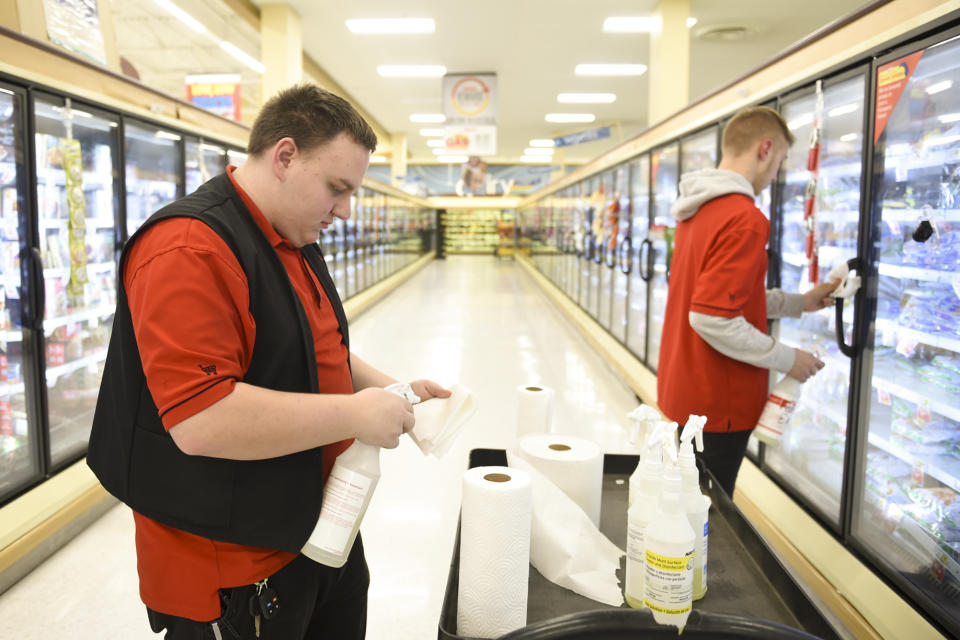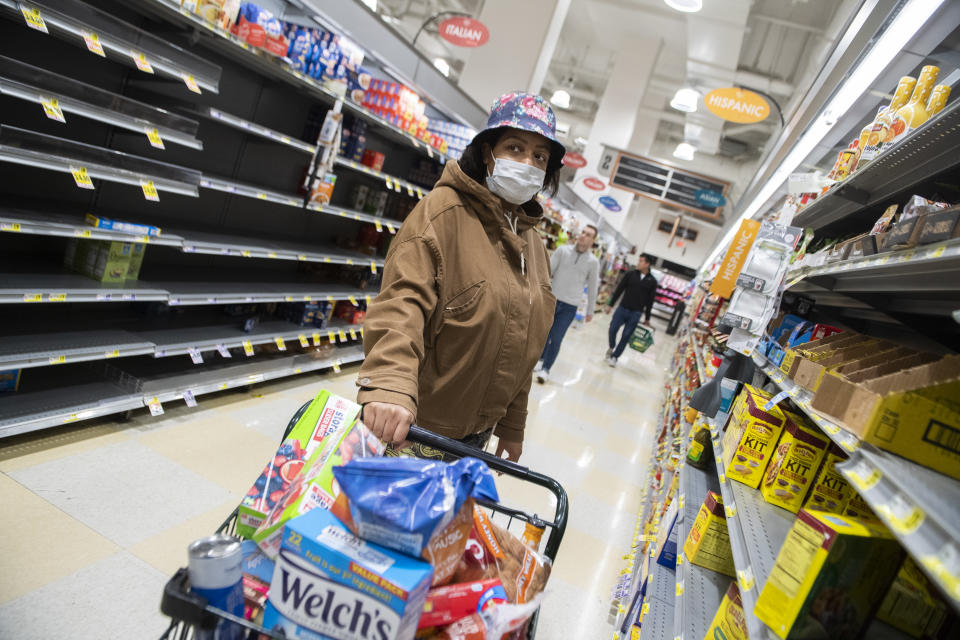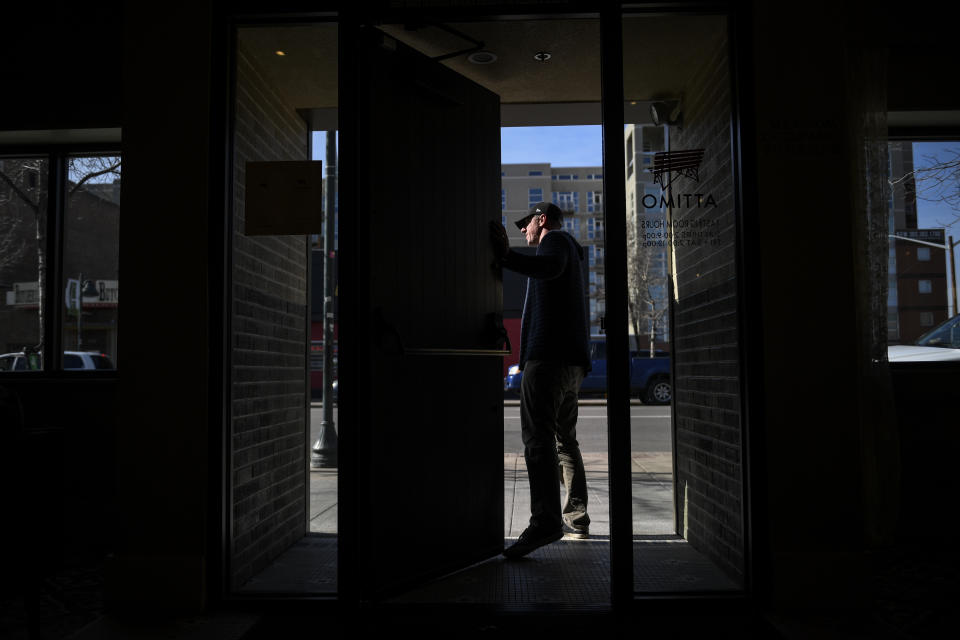'Like a zombie movie': Essential workers brave coronavirus pandemic in quarantined America
For the first week of the coronavirus pandemic, or more accurately the panic it wrought, Anthony had nightmares. “I woke up numerous times because I was dreaming I couldn’t put s*** on the shelf fast enough and people were basically rioting,” he says.
The 34-year-old works at a grocery store in San Antonio, and although most of the population has transitioned to working from home, his job cannot be done remotely. Anthony is one of the essential workers for whom the global upheaval hasn’t included a monotonous blend of sweatpants and video conferences, but rather the same daily routine rendered eerily apocalyptic through the absence of other people.
The nightmares have stopped but still every day is exhausting.
James — a 31-year-old engineer in Chicago who, like many in this story, asked for anonymity to speak candidly — feels similarly. His company had layoffs last year and nonessential staff have been sent home, but the manufacturing plant where he works is still operating at normal capacity.
“I have been in the industry for nine-plus years and I can honestly say the last two weeks have been the most stressful period of my professional life,” he says.
In Knoxville, Tenn., Jay Wigley is finally getting back to work. Although the 53-year-old, who does quality control in the medical devices manufacturing industry, is an “essential worker,” last week his wife got sick. She had a fever and a cough and was fortunately able to be tested for the coronavirus. The test came back negative, but while they were waiting for results, Wigley had to work from home. It wasn’t the first time he’d done so, but the pandemic made it feel starkly different.
“Not knowing was so much more vividly felt this time: not knowing her health, not knowing if I would also need to be tested, not knowing what the next days or weeks will bring,” he says. “But when I look back on that now, a week later, I see that we are all in a not-knowing situation, and I had a head start realizing that. We are all faced with much more I don’t know than we are used to living with in such a present way.”
Now when he wakes up, he feels better connected to the uncertain reality of life, but unlike most, he still has to go outside, go to his car and go to work.
‘Coming to work every day is extremely conflicting’
“I feel a little guilty in some ways,” Wigley says, “because so much of my day is unchanged, or bettered, such as my commute. I get to keep my routines, mostly.”
The commutes are a breeze for those workers who have been deemed essential. Around the country, workers say driving times are cut almost in half with so few cars on the road. Of course, if you look a little closer, the effects of the nation’s many stay-at-home orders can already be seen.

“It’s jarring to see all the dark windows and closed signs at restaurants and bars,” says Art, a 51-year-old pharmacist in Illinois. “You know some of those places just aren’t going to open again.”
“It totally feels like a zombie movie. Empty shelves, empty roads,” Anthony says. He admits that recently watching “28 Days Later” was probably a mistake.
Of course, not everyone is comfortable leaving the house right now. The United States just surpassed China for the most reported coronavirus cases globally — and that’s with insufficient testing. Staying home is the safest option, which makes having to go out for work all the more anxiety-inducing if you have increased cause for concern.
“Coming to work every day is extremely conflicting for me,” says James, the engineer. His wife is 13 weeks pregnant with their first child. She is able to follow the strictest precautions — except, of course, regularly being exposed to someone who is not. “Our levels of anxiety are bordering paranoia, especially given how the total victims climb every day.”
In Pennsylvania, the grocery store where 29-year-old Cory works has issued passes to their employees, explaining why they’re on the road in case they get pulled over on their way to and from essential jobs.
‘Risking almost certain illness for $15 an hour’
Every morning when he arrives at work now, Matthew Fratiani stops at the medical screening area first to get his temperature taken. If it’s above a certain threshold, he’ll be sent home. So far, he’s been in the clear.
Most of the people who work in Cleveland’s Board of Elections office have been put on paid administrative leave. But since Fratiani, 28, processes mail-in ballots, he’s still going into work, waiting to hear from Ohio’s secretary of state about when the postponed Election Day can take place.
They’re also checking employees’ temperatures at the sub shop in Columbus, Ohio, where 26-year-old Logan White is a manager. They close earlier and have made hand sanitizer abundantly available.
“But truthfully we are working in a tight space together, there’s not much we can do. If one of us gets it, it would be very hard to stop the spread,” he says.
The grocery store in San Antonio is limiting the number of customers who can be inside at any given time, and in addition to the hand sanitizer stations, they’ve installed plastic shields to protect the cashiers. They’re offering financial considerations for the extreme circumstances as well, which is especially welcome amid all this uncertainty: an extra $2 per hour in hazard pay and a relaxation of the overtime rules. Taken together with the collapsing economy, it’s an incentive to work 60-hour weeks, in grim contrast to all the medical recommendations to stay home and social media reminders to practice self-care.
“We've joked that we're like the miners in the ‘Chernobyl’ miniseries,” Anthony says. “Co-workers are realizing we're risking almost certain illness for $15 an hour.”

The people around them at work have never been more important to their personal wellbeing. Co-workers’ sense of precaution and community obligation is their greatest safety net — or not.
“I work with construction workers who are big Fox News guys, so they basically took it as seriously as our president did,” says Robbie, a 31-year-old construction sales rep in Connecticut. “Basically that it was a hoax and a joke until suddenly it was terrifying. Many still think it’s something funny, though. It’s unsettling.”
“I mostly worry about our drivers, though. They would be the ones to catch it and pass it to me,” he continues. “We deliver to hospitals and such and they say it’s like the first 10 minutes of a zombie movie out there.”
Working with, and fearing, the public
For people in a service profession, it’s not just their co-workers' habits they have to be concerned with; it’s also all the customers and clients. And while company-instituted policies and increased intensity in coronavirus coverage has improved the safety of workers, even recently some felt exposed to extremely risky behavior.
“It was apparent in the early days of this madness that no one really took the issue seriously,” says Cory, the Pennsylvania grocery store worker. “As the news kept reporting on the situation and as it continued to worsen each day, more and more people shuffled through the store, and more and more people failed even the most basic habits we've been instructed to employ in order to help fight the virus.”
He estimates that his store is doing three times the normal sales, with new shipments of staples selling out as quickly as they come in.
“Up until a couple days ago, you’d still routinely hear customers saying, ‘It’s not that serious,’ or ‘This whole thing will blow over,’” says Anthony. “We don’t hear it so much now. We also don’t get as many complaints about being out of stock on milk or eggs or toilet paper.”

For a lot of people, the threat of widespread COVID-19 outbreaks seemed distant or overblown until the upheaval of the sports world forced a broader reckoning on the country. Several workers cited the suspension of the NBA season and the cancellation of the NCAA tournament as a true wake-up call.
“But I still see elderly people shopping,” Anthony said. “We have a delivery hotline set up for the elderly, other companies are doing an ‘elderly shopping hour,’ but many older people are set in their ways and still want to shop for themselves. This is literally going to kill them and all we can do is watch.”
Are they bringing the virus home?
“My consistent feeling is overbearing guilt about transmitting the virus to someone else. I also feel overwhelmed, all the time,” James said. “It is extremely difficult to balance how concerned I am for my family with the risk I have to assume to support them.”
In some ways, coming home is the scary part. Everyone is afraid right now — feeling hopeless or helpless without historical precedent or a clear sense of how any of this plays out — but for many of these essential workers, the biggest concern is contracting the virus and inadvertently spreading it to others. Working outside the house means serving as a potentially dangerous thread between the world at large and the people they live with.
“I feel guilty for still working because of the legitimate possibility that the nature of the job will result in some bad shit happening,” Cory says. “But I feel even more guilty for possibly endangering my family just so I can sell people some chicken wings.”
The other big fear they expressed is what will happen next. Not with the virus, but with the increasing desperation in their communities.
“I just pray to god we don't see riots, looting, et cetera before the end of this,” James says.
“I'm more worried about living in a heavily armed state,” says Anthony. “I've seen ‘The Purge’ movies, I know what happens when society collapses.”
Overexposed and undervalued
Last week, 3.28 million Americans applied for unemployment benefits, shattering the previous record five times over. It’s hard to tell which is the lesser of two evils: the potential economic destitution of going without a paycheck for the indefinite future or the health risk of going into work during a pandemic. But at least some of the people we spoke to felt fortunate to be among the latter.
“The only bright side is I'm not feeling the economic anxiety a lot of my friends are since we know we have a steady paycheck coming in during all this s***,” Anthony says. He’s been able to pick up Clorox wipes and toilet paper for care packages he sends to more vulnerable relatives.

It’s a sentiment echoed by other food service workers like Logan. “I’m lucky, because I know if I wasn’t actively working, my employer would not pay my salary,” he says. “I live pretty paycheck to paycheck, so this wouldn’t be ideal for me. Unless the government suspends all bills, I will likely have no real solution aside from continuing to work, and continuing to put myself more at risk.”
An extra two bucks per hour in hazard pay probably isn’t enough to compensate for the risk. Beyond that, the shifting priorities of a country going through a pandemic underscores an economic stratification that’s far more arbitrary than we like to admit.
“For years, the food industry has been s*** on and told that we don’t deserve more money — that our careers aren’t ‘legitimate,’ ” Logan says. “But now when push comes to shove, we are the ones being forced to work and exploit ourselves. We’re told our jobs are ‘essential’ without getting compensated like ‘essential’ employees.”
And while some people still going to work begrudge their peers for sitting at home soaking up movie marathons, mostly they’re hyper aware of the system that undervalues them even now.
“I'm proud that I'm actually making a tangible difference in a lot of people’s lives. That what I do right now is more important than some marketing exec making 10 times what I make,” Anthony says. “But that also makes me resentful — that when this is all over that exec will still be making 10 times what I make. I’m resentful that nothing will fundamentally change.”
Read more from Yahoo News:

 Yahoo News
Yahoo News 


